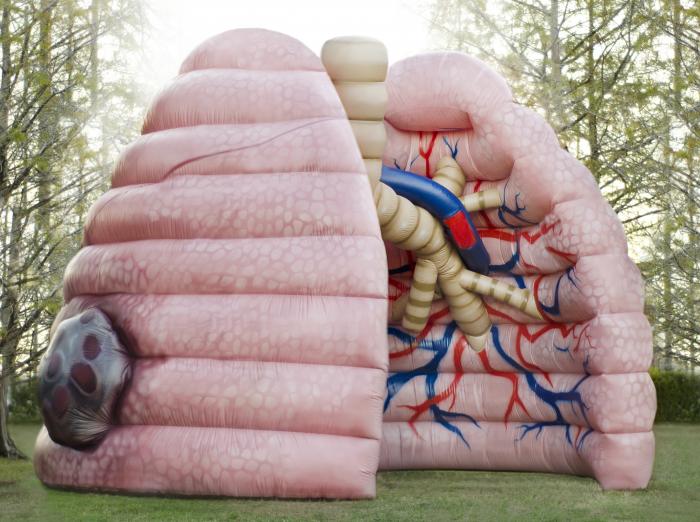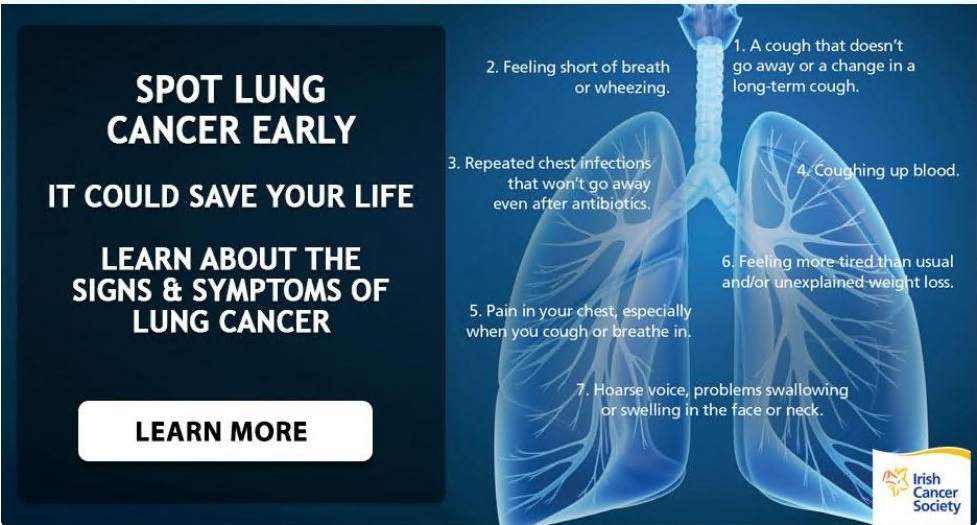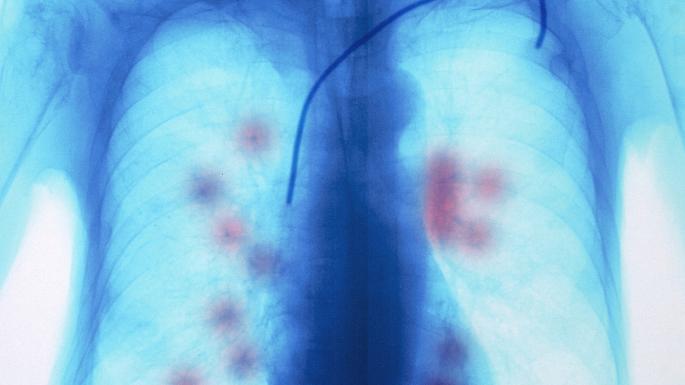MEGA lungs exhibit to take place in Dublin later this January

January 7th, 2019
The Irish Cancer Society has said that recent research by the National Cancer Registry of Ireland (NCRI) has shown that lung cancer incidence could double by 2045, with the possibility of substantial increases in the numbers of women being diagnosed with the disease.
As the Irish Cancer Society launches its annual lung cancer awareness campaign, supported by AstraZeneca, Aoife McNamara, Information Development Manager said, “over 2,500 people are diagnosed with lung cancer every year and it is very alarming that these numbers are projected to double over the coming decades.”

The lung cancer numbers, set out in the NCRI Annual Report, suggest that going by population changes alone, cases could double in numbers. However, if increases in female rates and decreases in male rates continue, female cases may substantially outnumber male cases in coming decades with projections showing a 176% increase for female cases.
Ms McNamara continued, “In order to address this increase, we must concentrate now more than ever on detecting lung cancer early. When lung cancer is diagnosed at stage I or II, two-thirds of patients survive at least a year compared with just one-quarter who are diagnosed with a later stage lung cancer. When lung cancer is diagnosed late, treatment options are limited, and survival rates remain very low.
“It’s really important for everyone to know the signs and symptoms of lung cancer and the importance of getting checked out. For example, if a person finds a lump in their breast, they know that they need go to a doctor or a breast clinic straight away. Similarly, if someone has difficulty breathing, is wheezing, or has a persistent cough, it’s really important to talk to a doctor immediately.
“As was set out in the National Cancer Strategy, we must work towards increasing the numbers of people diagnosed early while also developing a specific awareness campaign for lung cancer. I am delighted to announce that the Irish Cancer Society, supported by AstraZeneca, is bringing the MEGA lungs exhibit to Ireland as part of our lung cancer awareness campaign. The MEGA lungs is a pair of giant inflatable lungs which will be coming to Dublin in January and will encourage people to learn more about their lungs and lung health.”
This January, the Irish Cancer Society is also urging people to take its free online lung health checker quiz. This checker also includes a printable summary which can be taken to a GP.
The Irish Cancer Society provides support through its practical and medical services so that no-one has to go through their illness alone. To speak to a cancer nurse on any aspect of cancer, contact the Cancer Nurseline on Freephone 1800 200 700, email cancernurseline@irishcancer.ie or drop into one of 13 Daffodil Centres in hospitals nationwide.
The campaign has been covered in the (UK) Times:
Women at risk as forecast shows rise in lung cancer
Katie O’Neill, Ireland Reporter
January 7 2019, 12:01am, The Times
The health service must concentrate on early detection to prevent lung cancer diagnoses doubling by 2045, the Irish Cancer Society has warned.

Launching its annual lung cancer awareness campaign, the society said lung cancer cases in women could far outnumber men in the decades ahead,
Lung cancer cases could double as a result of population changes alone, research by the National Cancer Registry Ireland (NCRI) suggests. If increases in female rates and falls in male rates continue, female cases could soon substantially outnumber male cases.
According to NCRI projections, annual cases of lung cancer could increase in males from 1,356 in 2015 to 2,633 in 2045 and in females from 1,130 in 2015 to 3,124 in 2045.
Aoife McNamara, from the Irish Cancer Society, said: “Over 2,500 people are diagnosed with lung cancer every year and it is very alarming that these numbers are projected to double over the coming decades.”
“To address this increase, we must concentrate more than ever on detecting lung cancer early. When it is diagnosed at stage I or II, two thirds of patients survive at least a year compared with just one quarter who are diagnosed with a later-stage lung cancer. When lung cancer is diagnosed late, treatment options are limited, and survival rates remain very low.”
Ms McNamara said it was vital that people knew how to spot the signs of lung cancer if the disease was to be detected in its infancy.
“It’s really important for everyone to know the signs and symptoms of lung cancer and the importance of getting checked out,” she said. “For example, if a person finds a lump in their breast, they know that they need go to a doctor or a breast clinic straight away. Similarly, if someone has difficulty breathing, is wheezing or has a persistent cough, talk to a doctor immediately.
“As was set out in the National Cancer Strategy, we must work towards increasing the numbers of people diagnosed early while developing a specific awareness campaign for lung cancer.”
Other possible signs of lung cancer include repeated chest infections that persist even after treatment with antibiotics, feeling more tired than usual, weight loss and difficulty swallowing.


